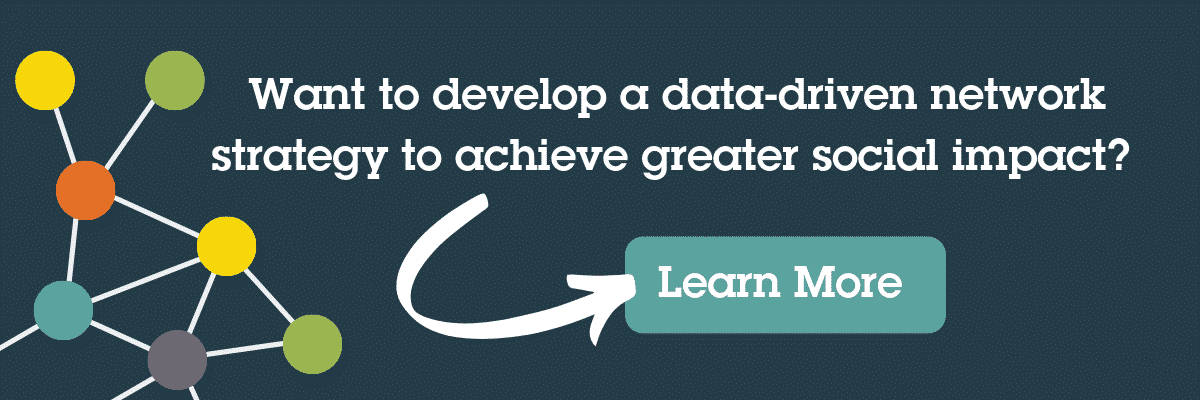
Defusing and De-escalating Conflict in a Network
If you’re part of a network of organizations working towards a common goal, you know that conflict and discord is inevitable. While we often agree on a great deal, no two partners agree on everything. When making major decisions, about long-term strategy, goal-setting or funding, disagreements can abound. Unlike traditional hierarchies, dealing with conflict in a network is more difficult as there are no single decision-makers or authority figures. You must work your way through the conflict, together. Here are some best practices on defusing and de-escalating conflict in a network before it takes control of you!

Prevent conflict in the first place.
Before conflict even comes up, there are things you can do to help proactively prevent it in your network. Co-create an exit strategy as a network early on, rather than waiting until a crisis arises. Try as a team to recognize when it is time to adapt and evolve as a network. This could mean to a more or less formal structure, a different mission/goal, or towards an exit. Finally, don’t be afraid to practice, record, and enforce transparent decision making. Being thoughtful and intentional about this process early on can prevent process-related conflict later on.Don’t avoid the conflict – deal with it.
If you want to defuse a conflict, you counter-intuitively have to first bring it into the light. Conflict breeds anxiety, which many of us would rather not deal with. However leaving a conflict in the background, simmering over time, is just asking for it to eventually boil over. If you proactively bring together those involved to solve the conflict before it gets out of control, you will be thankful in the long run.Remember your goal is conflict resolution – not being right.
Before you dig into the problem, make an individual commitment to your goal: resolving the conflict. Do what you can individually to take your ego out of the situation. We all have a subconscious urge to be right and get validation. It can easily get in the way of getting to a real solution. Taking the time to make a commitment to yourself will help you stick to it later on, and ignore rabbit holes that might lead you astray.Listen with Empathy and Validation!
When you’re in a debate, how well do you actually listen to the other person? Most of us aren’t really absorbing or thinking about the points the other person is making. Instead, we are usually thinking of objections to raise to their points, or thinking about the next thing we want to say. If this is the case, we are not really absorbing what they are saying – both sides just end up talking past each other. It’s as if two baseball players kept lobbing baseballs at each other, without bothering to wait to watch and catch the ball thrown by the other. Listen to the other person, and validate what they’re feeling! The trust can be critical for finding common ground later on.Avoid getting defensive or taking things personally.
Eventually, it is inevitable that someone in a conflict will say something hurtful or insulting. When this happens, you control your response 100%. Keeping your commitment to resolving the conflict, instead of taking things personally, will help you defuse the situation. No matter how much they take the “low road” you have to keep on the “high road.” Otherwise things will devolve quickly, and potentially catastrophically.Bring things back to common ground.
When things are really getting divided and you cannot find any compromise, try to bring the conversation back to the things you do agree on. It can be a common set of values, or a mission or goal that you both share. Bringing things back to common ground can build a small bit of trust to use as a starting point to build more difficult agreements. It helps people see the big picture, and remember that the details are just that… details. When you feel yourself descending into an argument over meaningless minor points, make sure everyone remembers the larger, common birds’ eye view.Get help from a facilitator or mediator!
If you’ve taken all our advice and you still cannot seem to get unstuck, consider bringing in someone to help. Sometimes a third-party, outside perspective is just what a network needs to de-escalate a conflict. If you bring in a mediator, expect them to interview all parties involved in the conflict first. Then they’ll work to facilitate an open, transparent and safe conversation about how to collectively come to a solution.Defusing and De-escalating Conflict in a Network.
Because networks are so fluid in decision-making and authority, conflicts over direction, strategy and goals are inevitable. However how response to such conflict is not pre-written. Through our reaction, we can make conflicts better, or worse, and get our network closer to a solution than we’d otherwise be. Remember to take the step of actively dealing with conflict. Listen with empathy, and focus on resolution rather than your own feelings. Avoid any temptation to get defensive, and bring things back to common ground when you can’t find a solution in the details. With these tips, you will be on your way to defusing and de-escalating conflict in a network!
About the Author: Paige Backlund Jarquin
President, Accord Consulting & Evaluation, LLC
Paige’s passion for social connectedness is a thread through her 20-years of experience. She has led program implementation, training, evaluation and research activities on community-based and community-led initiatives with organizations such as the Peace Corps, Planned Parenthood, the Colorado Department of Public Health and the Environment (CDPHE), the Colorado Clinical and Translational Sciences Institute, and the Regional Health Connector Program at the Colorado Health Institute. In her free time, you can find Paige training others on how to facilitate authentic community engagement, learning how to use her bead drill, and trying out a hiking trail with her partner and their kids.





